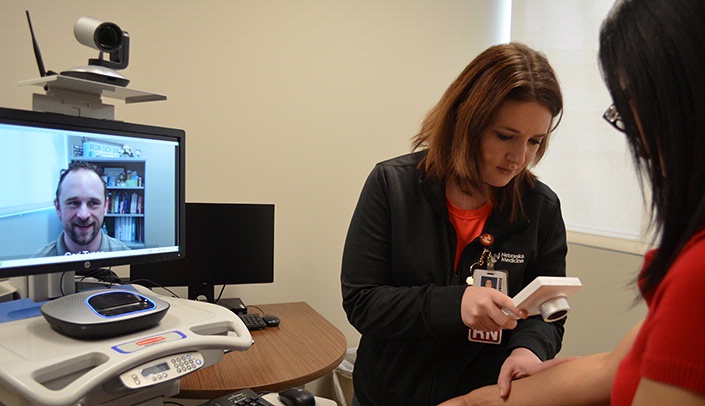A sudden red flag flashes onto a patient’s screen to alert Amy Stewart-Ranck, telehealth program coach and registered nurse with Nebraska Medicine, of a potential health concern.
Stewart-Ranck calls the patient, a young man with type II diabetes that she has been monitoring via a remote system for more than a month.
Through the course of their conversation, Stewart-Ranck determines his legs are overly swollen and sends him to the Midtown Clinic in Omaha, where a doctor diagnoses the young man with heart failure and takes measures to save his life.
Not all cases are as dramatic, said Geri Tyson, a registered nurse and telehealth program manager with Nebraska Medicine, but it demonstrates the effectiveness of remote patient monitoring using technology.
The telehealth, she said, "enables patients in their homes or in a rural setting to access the care they need when they need it."
The nurse coaches work in the Telehealth Innovations Hub on the fourth floor of the new Lauritzen Outpatient Center & Fritch Surgery Center at Nebraska Medicine and UNMC. The
hub houses a simulated clinic room and intensive care unit to help providers understand what the patient experience is like, as well as train them on the use of hand-held cameras, electronic stethoscopes and otoscopes, among other devices.
The almost $10 million, three-year Remote Interventions Improving Specialty Complex Care grant from the U.S. Department of Health and Human Services, Center for Medicare and Medicaid Innovation, is designed to improve patient outcomes for persons affected by type II diabetes post hospitalization.
And, it’s one example of how providers use telemedicine as
a way to meet patient needs at their point of care, said telehealth director Mary DeVany, "and it has been very successful."
"We are in the third year of the grant and have worked with nearly 1,500 patients so far," DeVany said.
Of those, 900 have completed their 90 days intensive monitoring and 68 percent of those patients improved their A1C blood sugar levels.
The patient uses a cellular monitoring device with attachments to measure blood pressure, blood sugar and weight from their home. They also record blood pressure, sugar and weight on the device and those readings are automatically uploaded and transmitted to a nurse coach.
If readings fall out of range, the system signals the nurse.
"Telehealth is a tool in the delivery of care that a provider can integrate into their clinic, and many already are doing so," DeVany said.
From psychiatry services being offered in more than 50 locations across the state, to kidney transplant follow-up care and endocrinology services, the use of telemedicine is expanding.
"Our goal is to make sure patients receive extraordinary care wherever they live," DeVany said.
Lauritzen Outpatient Center & Fritch Surgery Center Opens
Dedicated Dec. 17, the Lauritzen Outpatient Center & Fritch Surgery Center houses operating rooms, outpatient clinics, orthopaedic surgery research laboratories and educational space. The fourth floor, which houses the Telehealth Innovations Hub, is supported by a gift from Ruth and Bill Scott, and the building is named after the Lauritzen family for their generous support. The Fritch Surgery Center was made possible through a gift by Charles Fritch, M.D., and his wife, Judy. Dr. Fritch is a 1968 graduate of the UNMC College of Medicine. Other donors included Stan Truhlsen, M.D., a 1944 graduate of the UNMC College of Medicine and the lead donor on the Truhlsen Eye Institute; and Clarkson Regional Health Services.
Web extra
Learn more about the Lauritzen Outpatient Center & Fritch Surgery Center
